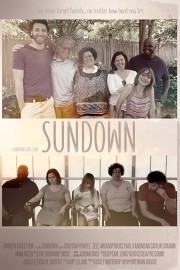Sundown
It was obvious watching “Sundown” that it came from a personal place, and sure enough, during the start of the end credits, we see the dedication, “For Pop.” Yes, writer-director Brendan Boogie is writing from feelings and experiences he knows, and I felt that because, I’ve understood those feelings, as well, because I’ve understood them.
“Sundown” is about a family dealing with a loved one’s deteriorating health. The family is the Sheas, and the loved one is the father, Solomon (Paul Kandarian), whose mind is caught in the deep regression of dementia. Solomon’s wife, Clara (Zele Avradopoulos), is a teacher of feminism at a local university, and is having a difficult time taking care of her husband after his latest episode. Her first thoughts towards familial help in taking care of her husband go towards their daughter, Tracy (Caitlin Graham), although that’s problematic as Tracy’s marriage to Todd (Nick Chambers), and their disabled adoptive daughter, need cared for. That leaves her son, Dewey (Grayson Powell), who wants to help, but has been immature his entire life, and also has a bit of a gambling problem. He wants to help, and Clara relents, and warns him that it’s not going to be as easy as he thinks.
When family dynamics shift due to loved ones getting irreparably ill, or dying, it can be jarring. I’ve experienced both over the years when my grandfather Mitchell was at the end of his life, and then, when my father died in 2013. It’s my grandfather’s situation I found myself thinking most about while watching “Sundown.” In addition to the deterioration of his body because of cancer, signs of dementia or Alzheimer’s ravaged his mind, as well, and it made the daily visits to assisted living to see him pretty painful for myself, my mother and friends and other family to see him in that condition. And dealing with his up-and-down mental state was most taxing, of all, and that’s something that rings true as this family is struggling to help Solomon lead as normal a life as he can, while giving them as much normalcy as possible in their lives. The emotions wear deep on these character’s faces, and it’s one of the things that stands out in “Sundown.” Clara has been dealing with it most directly, so she understands his tendencies most of all. Seeing her run the gamut of emotions, and start going to a support group for people with loved ones who have dementia, provides some of the purest emotional beats in the movie, especially when her mornings with “lucid” Solomon are interrupted, one day, by Solomon and Dewey sharing juvenile laughs. She’s hurt that Dewey stole moments she might have had with her lucid husband from her, and we empathize, because a friendship she’s build through the support group has shown her how precious what time she has with her “well” husband can be. Moments like this are where “Sundown” hits on real truth, and succeeds.
While the film has the family’s struggles with Solomon always on its mind, a lot of its focus is on Dewey, who is a perpetual screw-up trying to be responsible, even though he always seems to mess-up. This is, I’m guessing, the personal character for Boogie, but, unfortunately, a lot of his story arc doesn’t really resonate as much as the stuff with his father. When he’s dealing with his father, I feel closer to Dewey as a character, but the selfish, and self-destructive behavior, that leads him to meet Chelsea (Anna Rizzo) doesn’t really interest me as much, even though it’s clear why it’s important to the story. When those two story elements converge is the only time the latter really grabs me, because it leads to some of the most difficult times the family has with Solomon. “Sundown” doesn’t always work, but when it does, it has an emotional sting that is difficult to shake.










